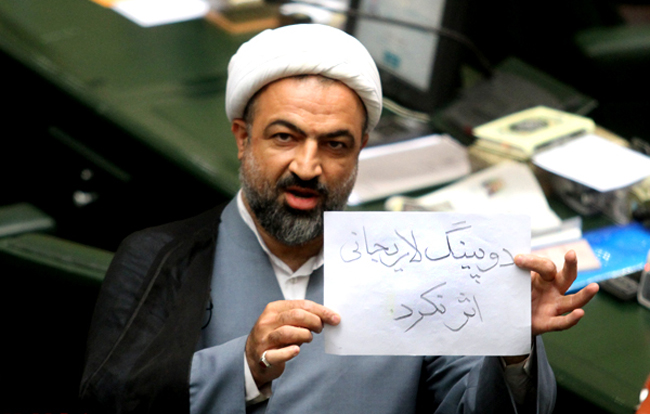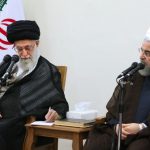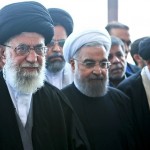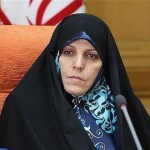by Farideh Farhi
The photo of hard-line Iranian MP Hamid Rasai said it all. After 145 members of the Parliament (out of 290) voted to remove the minister of sciences, research and technology, Reza Faraji-Dana, Rasai gleefully held up a note that says, “Larijani’s doping didn’t work.” In Rasai’s telling, Larijani’s surreptitious attempt to push through the minister was unsuccessful.
After a year of relative political calm, initiated by the presidential election of Hassan Rouhani, and their seeming marginalization, the hard-line MPs close to the Steadfastness Front, estimated at no more than 50, were able to break the ranks of conservatives and draw enough support from the caucus that supported Ali Larijani’s speakership to remove Faraji-Dana, the minister deemed closest to the reformists and largely supported by the university students and faculty.
In turn, Rouhani immediately appointed Faraji-Dana as his advisor for scientific and educational affairs and even more pointedly designated Mohammad-Reza Najafi as the caretaker for the ministry. Najafi was one of the three ministers who did not receive sufficient votes to become minister of education when Rouhani introduced his cabinet in August 2013. By law, Rouhani has three months to appoint a new minister who will have to be confirmed by the Parliament.
Suddenly, Iran seems to have been catapulted into the open institutional and political conflicts of the Mahmoud Ahmadinejad era.
The removal is a short-term victory for the hard-liners. They have been harassing the new administration on every possible issue, dragging various ministers — including ministers of foreign affairs, petroleum, education, and Islamic guidance — into Parliament for questioning. Up to Wednesday, however, their efforts had been limited to bombastic speeches and expressions of dissatisfaction with various ministers’ conducts and responses to the questions posed by the Parliament. The Majles leadership, mostly consisting of conservatives, appeared to be in control. Hard-liners were allowed to vent, at times even in an extreme fashion. One MP even went as far as accusing the president of being a British agent. But they were not allowed to set the tone for the relationship between the Majles and Rouhani. Now, with the removal of Faraji-Dana, they have shifted from being controlled to in control.
Their ability to unseat a minister — on the pretext that he was too close to the “seditionists” of the 2009 election; appointed people with seditionist backgrounds to high administrative and university positions; reinstated some of the professors fired by Ahmadinejad’s ministry; and “failed” in confronting “anti-revolutionary activities” at the universities — is as much a setback for the Rouhani administration as it is for the Parliament’s conservative leadership in leading and controlling its own ranks.
Before it occurred, there was much talk that the impeachment was because of the ministry’s revelations regarding unjustified scholarships given to the friends and family members of some MPs. But during the proceedings, it became clear that the hard-liners’ trump card was the generation of fear over the opening of Iran’s university environment, which Rouhani had promised to pursue during his campaign. While members of the hard-line Steadfastness Front mostly allowed others to make the case for Faraji-Dana’s removal, the MPs who called for his unseating constantly warned about the re-infiltration of “seditionists” in the university environment. Even video clips were used to show that some of the administrators and university rectors appointed by Faraji-Dana were supportive of student protests in the wake of the contested 2009 presidential election.
After five years of repeated declarations about the defeat of “sedition,” the argument that the conservatives should be fearful of a more open and active university environment won the day. To be sure, 110 MPs, an overwhelming majority of them conservative (there are hardly any reformists in the Parliament), voted against the removal. But Larijani’s inability to maintain the unity of his conservative bloc is a big crack that needs to be addressed; the hard-liners, giddy over their success, will now likely go after the minister of culture and Islamic guidance, Ali Jannati, for the crime of allowing the reintegration of the “seditionists” into the arts and cultural environment. The continuation of the split within the conservative ranks not only raises the specter of a return to the policies that people rejected in the 2013 election, it also reveals the failure of the conservative leadership in the Majles.
Meanwhile, by appointing Najafi as the caretaker of the ministry, Rouhani is doing two things. First and foremost, he made a clear statement that he is keen on maintaining the support of the people who voted for him. That is why in his letter of appointment he clearly stipulated that he wants Najafi to continue from where Faraji-Dana had left off. Najafi, who has held many key positions in the Islamic Republic and is the founding member of the centrist Servants of Construction Party, is popular among both reformists and centrists. A mathematician, trained at Sharif University and MIT, he is perceived as both deliberate and decisive.
Secondly, Najafi’s appointment as a caretaker gives him and Rouhani sufficient time to complete the changes of university leaderships that were begun by Faraji-Dana but were left incomplete due to the threat of ministerial impeachment. It is a power that the president and his caretakers hold — ironically used to the full extent by Ahmadinejad — and which contributes to the increasing strength of the president’s office vis-à-vis other institutions of the Islamic Republic.
At the end of the day, the hard-liners triumph may also be pyrrhic. Faraji-Dana was not a particularly political minister. An electrical engineering professor, he was a well-liked rector of the University of Tehran during the last two years of the Khatami presidency. He was ironically appointed to that position after the reformist sixth Majles did not confirm him as minister of sciences and technology because his political views were not clear. Indeed, he was deemed insufficiently reformist!
The bigger issue for the hard-liners, however, is the impact that this impeachment may have on the wider public, who will go to the polls in 18 months or so to elect a new Majles. The most vocal hard-line members of the current Majles, elected in March 2012, are mostly from Tehran, where voter participation was very low due to the anger generated by the 2009 election and its aftermath. Some of the Tehran MPs, including Hamid Rasai, managed to get into the Majles with only a few hundred thousand votes in a city that, according to Interior Ministry officials, had close to 5.5 million eligible voters in 2012. Pushing through actions that motivate people to vote for a Majles that is more synchronous with the newly elected president could ultimately harm these hard-liners’ interests.
To be sure, Iran is in a different place than it was in 2000, when the country overwhelmingly voted to elect a reformist Majles that was in harmony with the reformist President Mohammad Khatami. The reformists know that the conservative Guardian Council will probably disqualify most, if not all, of the known reformist candidates. But 8 years of the Ahmadinejad presidency, and the centrist-reformist coalition (with some moderate conservative help) that elected Rouhani has highlighted the importance of organizing alliances that marginalize hardliners and push through policy agendas that differ from those formulated by people whose sole political strategy, as evidenced by Faraji-Dana’s impeachment hearings, seems to be yelling sedition.
Photo Credit: Houshang Hadi/ILNA






Thank you for this well-informed article, which shows the divisions in the Islamic Republic and the efforts of the hardliners to oppose President Ruhani’s tentative reforms. The Iranian Parliament or the Majles is composed of a majority of conservative MPs who normally agree with Majles speaker Ali Larijani not to obstruct the work of the government. However, there is a minority of diehard supporters of former President Ahmadinejad who managed to persuade enough relatively moderate conservative MPs to join them to impeach the science minister.
However, as you point out, the hardliners’ triumph may also be pyrrhic in another sense, because towards the end of Ahmadinejad’s government a major split occurred between his ultra-radical supporters and the bulk of the conservatives who had voted for him and even between Ahmadinejad and Ayatollah Khamenei. Yesterday’s victory by the radical hardliners will scare the other relatively moderate conservatives because they will see a revival of Ahmadinejad’s supporters getting ready to contest the next Majles election not only against the reformists and moderates but also against the conservatives. This should revive the memories of the last presidential election when Ahmadinejad’s supporters refused to form a coalition with other conservatives.
Another point that should be made in this connection is that President Ruhani’s stance against his hardline opponents has been weak and indecisive. There is a need for an inevitable fight between the reformists and the hardliners in Iran, and the longer he leaves it the more difficult it will get. President Khatami’s mistake was that he tried to compromise with the hardliners and as a result he completely lost out to them. Mr. Ruhani should not repeat that mistake. Last presidential election showed that the majority of Iranian people are totally fed up with the hardliners and support reformist and moderate policies. He should use his mandate in order to push for reforms. The best that one can hope for is that he is waiting for the outcome of the nuclear talks so that he can confront the hardliners from a position of strength. The longer it takes for a permanent nuclear agreement to be reached with Iran the bolder will the hardliners get, and this will not be either in the interest of Iran or the West
Good post. Between this and what Farhang wrote, one could be excused from thinking they’ve seen this play before. I wonder, do they have lobbyists in Iran too, like in the U.S., especially seeking and wielding influence for a foreign powers benefit over their own?